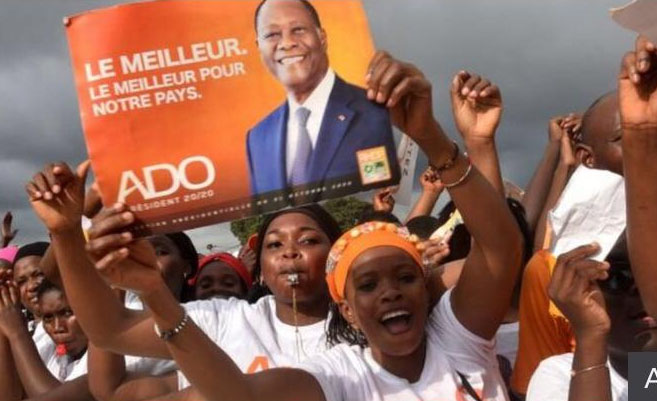Alassane Ouattara
The President of Ivory Coast, Alassane Ouattara, has won a historic third term.
He polled 94% of the votes to seal his third term as President of Ivory Coast.
The election was boycotted by the opposition.
Mr Ouattara won 99% of votes in some of his strongholds, with voters turnout around 54%.
The result is subject to confirmation by the Constitutional Council of Ivory Coast.
Meanwhile, the opposition in Ivory Coast has vowed to form a transitional government which would organise a new election, with the main opposition candidates Pascal Affi N’Guessan and Henri Konan Bédié urging their supporters not to vote.
The two opposition leaders got 1% and 2% respectively, while a fourth candidate, Kouadio Konan Bertin, also got 2%, according to the official results.
What Does Ivory Coast’s Constitution Says about presidential term limit?
Ivory Coast’s Constitution makes provision for a two-term presidential limit.
Prior to 2016, Mr Ouattara said he would step down after term ended this October. There were constitutional changes in 2016 which his supporters say give him the opportunity to contest for the third time.
However, in July 2020, he stated that he was contesting for the third time. That was after his ruling party’s then presidential nominee, Prime Minister Amadou Gon Coulibaly passed away after receiving treatment for heart complications.
Deaths
Pre-election riot which broke out in August 2020 following Mr. Ouattara’s announcement that he will contest for the third time, has resulted in the deaths of some 16 persons.
The AFP says some nine persons were murdered during Saturday, October 31, 2020 elections.
Another civil war?
DGN Online has gathered that about 35,000 security officers were deployed nationwide in Ivory Coast to transport voting materials and as well ensure safety.
Mr. Ouattara himself voted in Abidjan on Saturday, calling on citizens afterwards to stop civil disobedience.
“I call on those who called on civil disobedience, which led to loss of life, to stop,” the Ivoiren leader urged.
He stressed “they should stop because Ivory Coast needs peace, these are criminal acts and we hope that all this can stop, so that after the election this country may continue on its course of progress, which it has enjoyed over the last few years.”
Ivory Coast has experienced a dark civil war for decades in the past.
An independent election group, Indigo Cote d’Ivoire, has reported that Saturday’s election was characterized by violence, electoral malpractice, and intimidation.
Reports say anti-riot police in Ivory Used teargas in dispersing opposition supporters in Blockhauss, Abidjan.
Another Civil Society Organization, PTI Advocacy Group, in a statement, revealed that “an election is the moment when a society comes together to experience and live out democracy, but the context that prevailed on election day…shows that a large segment of the Ivorien population did not experience in peace.”
According to the United Nations Refugee Agency, thousands of people have fled to neighboring countries. The Agency says those who have ran fear there could be more violence.
The European Union Foreign Policy Chief, Joseph Borrel, has noted that incitements to hatred were ongoing in Ivory Coast.
By Melvin Tarlue

